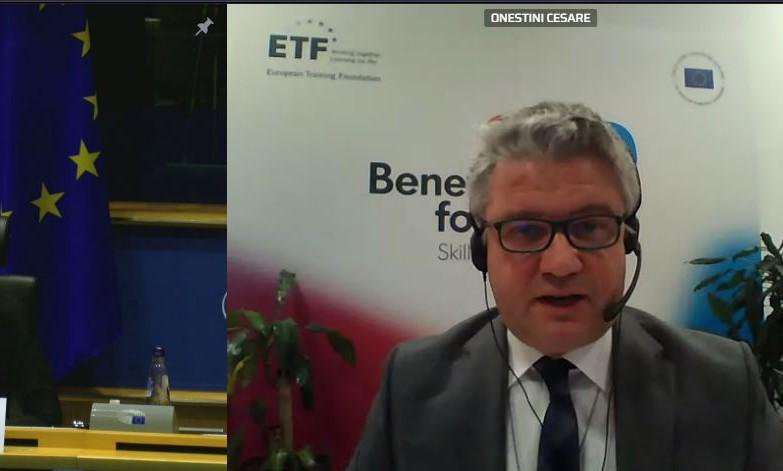
ETF's work and plans presented to European Parliament
The ETF Director, Cesare Onestini, met with the European Parliament’s Employment and Social Affairs Committee on 1 February 2020 to share the ETF’s achievements in 2020 and present plans for 2021.
Achievements 2020
Education and training systems worldwide faced a tumultuous year in 2020. The ETF responded to the pandemic by adapting and reviewing quickly its support to partner countries, monitoring and assessing policy responses and promoting best practices.
"In spite of the pandemic, ETF was able to continue to deliver support to partner countries, albeit with different working methods. This support included real-time monitoring of policy responses, sharing best practice, assessment of some key challenges and proactive and participative communication actions" said Onestini.
The Covid-19 pandemic highlighted the vulnerability of learning and training, particularly regarding vocational education which faced significant difficulties due to the lack of practical lessons because of social distancing measures and the fragility of systems in being able to mobilise resources to respond.
As soon as the pandemic started disrupting provision of education and training, the ETF undertook a regular mapping of policy measures implemented in its partner countries. The mapping was shared with stakeholders and then followed up in different ways, for example by focusing on areas of common concern for vocational systems, promoting the sharing of good practice amongst countries, anticipating discussion on challenges for learners and trainers.
All activities developed as part of the pandemic response were accompanied by targeted communication campaigns, beginning with the #learningconnects campaign, and the use of social media and live events such as webinars and Facebook Live interviews with practitioners to support education systems, schools, teachers and learners respond to the crisis.
The ETF worked with EU Delegations and the services of the Commission and the External Action Service to contribute to the reprogramming of EU support as part of the Team Europe approach.
In 2020, the ETF also worked closely with the European Commission in the development of the Western Balkans Agenda for Innovation, Research, Education and Culture and with regard to the European Pillar of Social Rights, the Council Recommendation on Vocational Education and Training and the New Skills Agenda.
Work Programme 2021
The growing prominence of human capital development in the EU’s external relations programmes and policies, also linked to the UN Sustainable Development Goals, means a growing demand for the ETF’s services. In response, the ETF’s 2027 Strategy foresees a transparent approach to differentiating the services it provides to ensure impact and added value in driving durable system change.
In this context the ETF Director informed parliamentarians of the ETF's focus within its new 2021-2027 strategy on the following three core areas:
- Creating and developing a Knowledge Hub focusing on some key actions such as a Skills Lab, Creating New Learning and supporting networks of excellence in VET. Such actions will be developed in close cooperation with international partners and with the EU Agency Cedefop
- Developing and tailoring policy advice to partner countries, to EU institutions and Member States.
- Supporting and sustaining reform of lifelong learning systems within partner countries. As part of this we will jointly hold an international conference with UNESCO, 21-25 June, to look closer at the building blocks of lifelong learning systems and the role of the international community in promoting systematic and sustainable reforms
Other invitees to the parliament session included the Directors of four other European Union Agencies working complementarily in this policy area: the European Foundation for Living and Working Conditions, the European Agency for Safety and Health at Work, the European Centre for the Development of Vocational Training (Cedefop), and the European Labour Authority.
Did you like this article? If you would like to be notified when new content like this is published, subscribe to receive our email alerts.